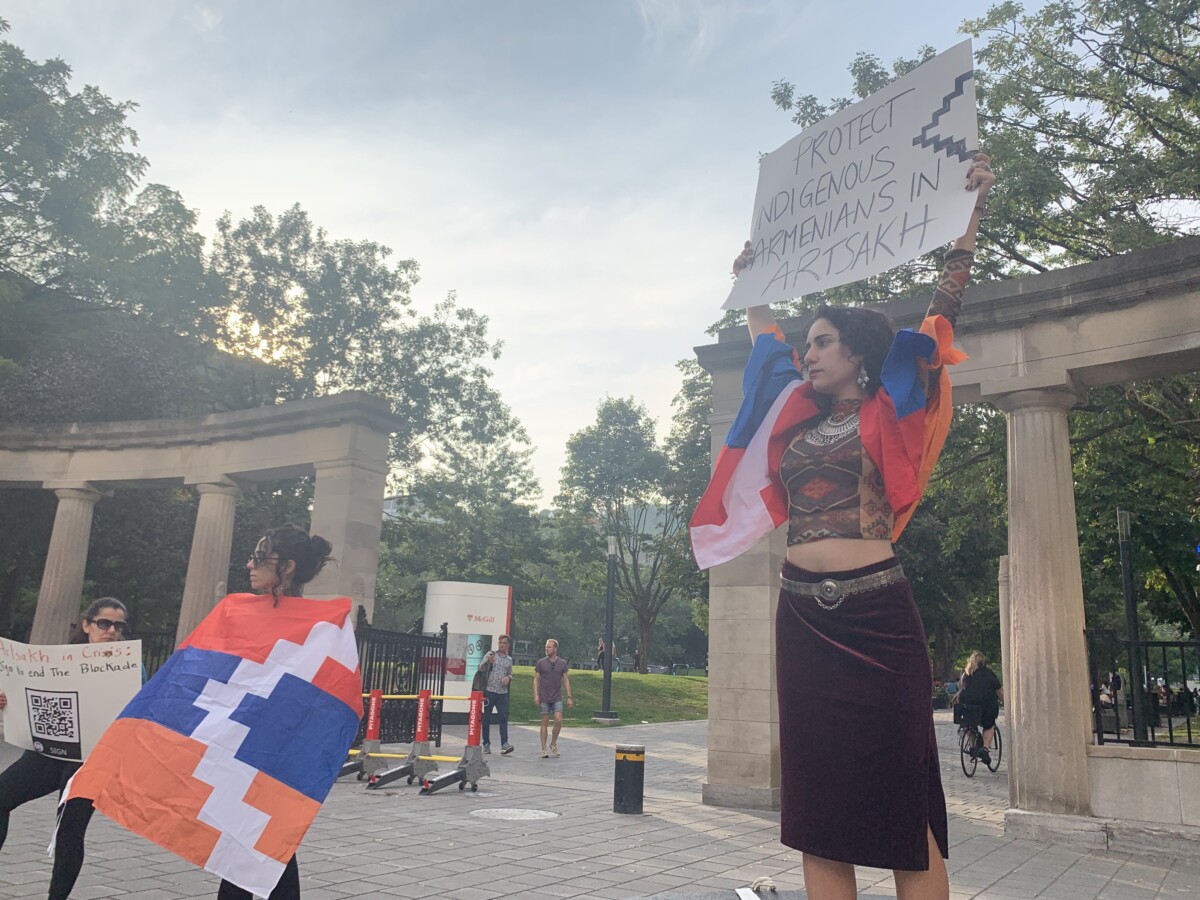There is a war to be fought in the hearts of Montreal Armenians as ancestral land falls to neighboring forces.
As the evening cold sets on Sept. 23, an ancient tune reaches the ears of Montrealers near the McGill campus on Sherbrooke street.
Its trail leads to the university’s Roddick Gates, in front of which a handful of people stand tall alongside a pair of speakers, large banners raised above their heads and dressed in muted colours. Some are adorned in flags flushed of red, blue and orange, wrapped and held tight to their person.
As the melody carries further into the city, a young woman walks forward to the edge of the sidewalk. Slowly, she pours a dirt-red viscous liquid onto her dress.
Passersby halt, their gaze locking on her as she stands on a white sheet that absorbs the residual liquid.
Their eyes eventually fall upon the words scribbled amateurishly across the banners: ‘Protect indigenous Armenians in Artsakh’ can be read on one of them. And the message becomes just a little clearer.
The protest was in response to Azerbaijan’s initial offensive on the capital of the Republic of Artsakh, recognized internationally as Nagorno-Karabakh. The breakaway region is located in Azerbaijan but is governed by its indigenous Armenian inhabitants.
“It feels like I have so much to lose now and something to protect,” said Maral Matig, one of the protesters and a Concordia student in design. “It’s a deep pain that I haven’t always felt.”
The attack was seen as a violation of the ceasefire brokered in 2020 between Armenia and Azerbaijan in the aftermath of the second major conflict for the region.
“It was always in the background,” Matig said, referring to the 2020 war. “I was suppressing my emotions. It’s the first time in my life I’ve taken any type of concrete action.”
Since the early 20th century, Nagorno-Karabakh has long been disputed between its two Caucus neighbours. Although recognized internationally as a part of Azerbaijan, de facto control lay in the hands of its ethnic Armenian inhabitants since the 1990s—until now at least.
More than half of the Nagorno-Karabakh population has fled due to Azerbaijan’s current control over the region. This outpour was a result of a cessation of conflict a mere day after the peace was broken again.
“They are trying to completely erase the Armenians’ identity in the region and they won’t stop,” Matig said. “We just want to live, we just want peace. And that’s it.”
Back in March, Azerbaijan launched an unprecedented blockade on the path used to establish connection between Armenia and the Republic of Artsakh, known as the Lachin Corridor. This created a humanitarian crisis in the region, with the population having to ration food and medicine among other issues.
Matig considered the blockade prelude to the on-going situation as news of rising tensions appeared on her online feed.
Now, armed only with her passion, Matig took to the streets with fellow Armenians art students to raise awareness for last week’s events.
However, Matig explained her efforts are left unheard, as the international community offered little to no support to Karabakh’s former inhabitants. She feared this lack of support or condemnation to certain actors may lead to future escalation onto the country of Armenia itself. This fear is shared by many Armenians due to their contentious history with local powers since the 1915 genocide, perpetrated by the Ottoman empire.
“We just want peace, we just want to live. It’s about survival, the continuation of our culture,” Matig explained. “Because we’ve been through way too much for this to keep happening.”
Mesrob Arsenian, president of the Concordia Armenian Students Union, shared similar feelings. “It’s a struggle—you have to fight as long as you want to keep your identity,” Arsenian said. “It’s a part of being Armenian.”
Arsenian felt strongly about the ongoing development. However, his faithful pride was sullied as he could only watch events unfold online, halfway across the world.
Arsenian was not surprised by the news, as little was done since 2020 to prevent any kind of attack in Karabakh. Russia, for example, an ally to Armenia, has mostly taken a diplomatic role between the two nations, brokering cease fires or keeping the peace on the ground post-war, a responsibility inherited from the Soviet Union.
This diplomatic approach taken by nations at large was something Arsenian criticised heavily. “I know nothing is going to change but please do something because this [inaction] is getting ridiculous,” Arsenian said. “You can’t choose which human rights to care for and which not to.”
Many in positions of power or expertise, have condemned the Azeri government’s actions.
Kyle Matthews, the Executive Director of the Montreal Institute for Genocide and Human Rights Studies at Concordia University, has done the same.
Matthews previously served as a United Nations official in the Southern Caucasus region and highlighted the severity of the crisis, calling for immediate action to assist the Armenians fleeing the region.
“What we’re seeing happen today is a grave violation of international norms and standards,” Matthews said.
Describing the current situation as “potential ethnic cleansing,” Matthews stressed that international law prohibits such actions, no matter what may be classified as after the fact.
Matthews explained Azerbaijan has long found an ally in Turkey, from whom they receive support both politically and militarily. For a time, the south caucasian power received aid indirectly from Canada in the form of drones. Otherwise, Matthews said Canada as a nation has no interests in the region.
If nations were to choose harsher condemnation, Matthews suggested issuing economic sanctions against Azerbaijan or stopping trade relations.
“Rhetorical condemnation to a government who’s looking to displace a people is not enough,” he added. “Something more robust has to happen and putting a statement of concern on Twitter is not going to do that today.”
